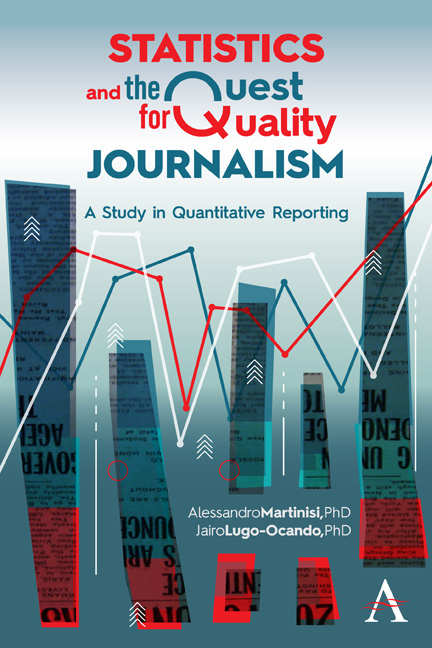Book contents
- Frontmatter
- Dedication
- Contents
- List of Illustrations
- 1 Introduction
- 2 Numbers as Information in the Information Society
- 3 The Never-Ending Debate on Quality in Journalism
- 4 Statistics in Journalism Practice and Principle
- 5 The Normative Importance of ‘Quality’ in Journalism
- 6 Journalism Meets Statistics in Real Life
- 7 The Ideology of Statistics in the News
- Epilogue
- References
- Index
1 - Introduction
Published online by Cambridge University Press: 07 November 2020
- Frontmatter
- Dedication
- Contents
- List of Illustrations
- 1 Introduction
- 2 Numbers as Information in the Information Society
- 3 The Never-Ending Debate on Quality in Journalism
- 4 Statistics in Journalism Practice and Principle
- 5 The Normative Importance of ‘Quality’ in Journalism
- 6 Journalism Meets Statistics in Real Life
- 7 The Ideology of Statistics in the News
- Epilogue
- References
- Index
Summary
In his 1903 book Mankind in the Making, the British science-fiction novelist and social commentator Herbert George Wells (1866–1946) argued for a new type of political system in which society renounced any claim of absolute truths and people's ideas were based on presented facts – a system in which overall policy and public affairs in society were scientifically examined in the light of mathematical and statistical reasoning. Wells would go on to argue that
The great body of physical science, a great deal of the essential fact of financial science, and endless social and political problems are only accessible and only thinkable to those who have had a sound training in mathematical analysis, and the time may not be very remote when it will be understood that for complete initiation as an efficient citizen of one of the new great complex world-wide States that are now developing, it is as necessary to be able to compute, to think in averages and maxima and minima, as it is now to be able to read and write. (Wells, [1903] 2014)
Wells, who was a biologist by training and one of the top science-fiction writers of the time, lived in the age of modern scientific utopias, marked by the rise of industrialization and workers’ struggles. However, what makes Wells’ contribution so relevant today is that he was standing up against Eugenics at a time when other intellectuals, including some fellow socialists, were siding with this racist pseudoscientific idea.
Wells was not opposed to a science of heredity, nevertheless he rejected the notion of Francis Galton (1822–1911), the father of modern statistics, that the state should intervene in order to breed human beings selectively. Positive traits such as beauty, health, capacity, and genius, as well as supposed negative traits such as criminality and alcoholism, says Wells, are in fact such complex entanglements of characteristics that ignorance and doubt bar our way. Still today at the Rijksmusem Boerhaave of science and medicine in Leiden, the Netherlands, the visitors can see some drawings of a facial angle, a geometrical system invented by the Dutch scientist Petrus Camper (1722–1789) and later used to justify slavery and racism.
- Type
- Chapter
- Information
- Statistics and the Quest for Quality JournalismA Study in Quantitative Reporting, pp. 1 - 14Publisher: Anthem PressPrint publication year: 2020



